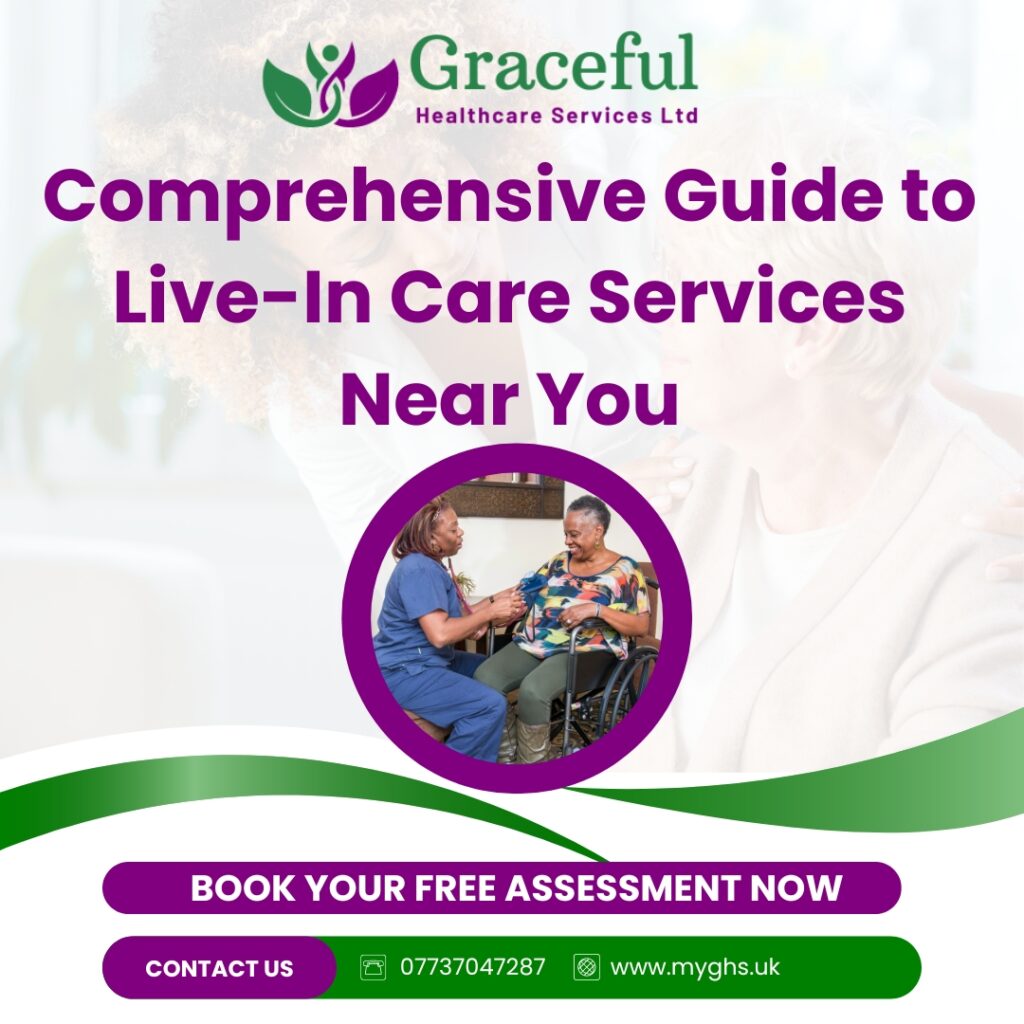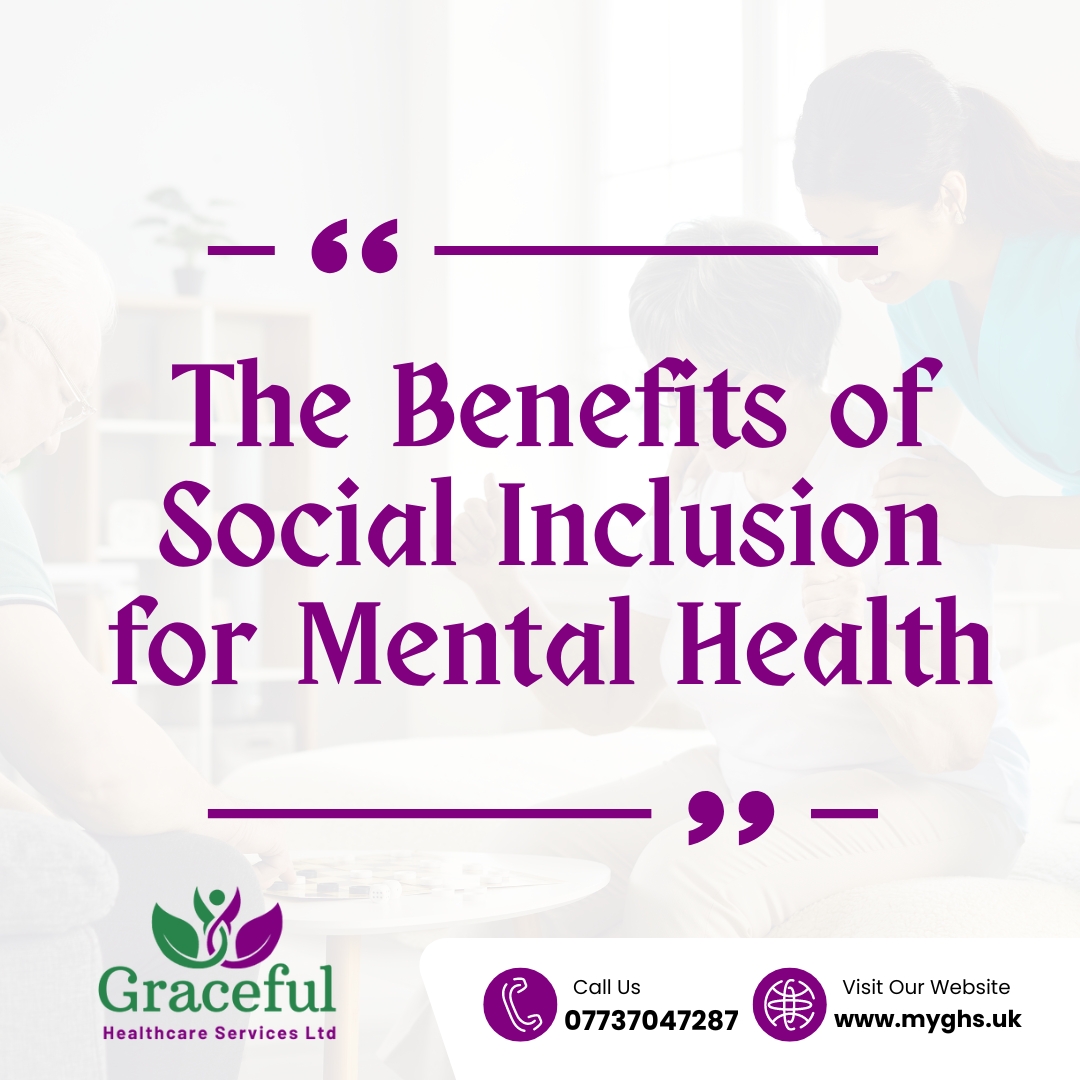
As our population ages and healthcare needs evolve, more people are seeking alternatives to traditional residential care homes. Live-in care services have emerged as a popular option, offering personalised, round-the-clock support in the comfort of one’s own home. This comprehensive guide explores the world of live-in care, helping you understand what it entails, its benefits, and how to find quality “live-in care near me” options.
Understanding Live-In Care
Live-in care, also known as 24-hour care, is a form of homecare service where a trained carer lives in the client’s home, providing continuous support and assistance. This arrangement allows individuals with complex care needs to remain in familiar surroundings while receiving professional care.
Key Features of Live-In Care:
- Round-the-clock support
- Personalised care plans
- Assistance with daily living activities
- Companionship and emotional support
- Medication management
- Household tasks and meal preparation
Live-in care services can be tailored to meet a wide range of needs, from elderly care to support for individuals with disabilities or chronic health conditions.
The Benefits of Live-In Care
Opting for live-in care offers numerous advantages over residential care homes:
- Familiar Environment Staying in one’s own home can significantly reduce stress and anxiety, particularly for individuals with dementia or other cognitive impairments.
- Personalised Care Live-in carers can provide highly personalised care, adapting to the client’s routines, preferences, and changing needs.
- One-to-One Attention Unlike in care homes where staff attention is divided, live-in care ensures dedicated, one-to-one support.
- Maintained Independence Clients can maintain a higher level of independence, making choices about their daily activities and routines.
- Continuity of Care Having the same carer consistently allows for stronger relationships and better understanding of the client’s needs.
- Pet Companionship Live-in care allows individuals to keep their beloved pets, which can be a significant source of comfort and joy.
- Cost-Effective for Couples For couples needing care, live-in services can be more cost-effective than two places in a care home.
Providers like Graceful Healthcare Services offer comprehensive live-in care services, ensuring clients receive high-quality, personalised support in their own homes.
Who Can Benefit from Live-In Care?

Live-in care services can be suitable for a wide range of individuals, including:
- Elderly individuals needing assistance with daily activities
- People with chronic health conditions requiring regular monitoring
- Individuals recovering from surgery or illness
- Those living with dementia or Alzheimer’s disease
- Adults with physical disabilities or learning difficulties
- People nearing end-of-life who wish to remain at home
The flexibility of live-in care means that services can be adapted to meet diverse and changing needs.
Types of Live-In Care Services
When searching for “live-in care near me,” you’ll find various types of services available:
- Elderly Care Focused on supporting older adults with daily living activities, medication management, and companionship.
- Dementia Care Specialised care for individuals living with dementia, including safety monitoring, memory support, and behaviour management.
- Complex Care For individuals with multiple health conditions or high-level care needs, including those requiring medical interventions.
- Respite Care Short-term live-in care to provide a break for regular family carers.
- Palliative Care Compassionate end-of-life care focused on comfort and quality of life.
- Rehabilitation Support Assistance for individuals recovering from surgery, injury, or illness, often including support with physiotherapy exercises.
Homecare services providers like Graceful Healthcare Services offer a range of specialised live-in care options to meet diverse needs.
What to Expect from Live-In Care Services
Live-in care typically includes a wide range of services to support daily living and overall well-being:
- Personal Care Assistance with bathing, dressing, grooming, and toileting.
- Medication Management Ensuring medications are taken correctly and on time.
- Meal Preparation Planning and cooking nutritious meals according to dietary requirements.
- Housekeeping Light household tasks such as cleaning, laundry, and tidying.
- Mobility Support Assistance with moving around the home and transfers.
- Companionship Engaging in conversation, activities, and outings.
- Health Monitoring Observing and reporting any changes in health or well-being.
- Appointment Management Arranging and accompanying clients to medical appointments.
- Social Activities Supporting participation in hobbies, interests, and community events.
- Night-time Support Assistance during the night as needed.
The Costs of Live-In Care

When considering “live-in care near me” options, it’s important to understand the associated costs:
Factors Affecting Live-In Care Costs:
- Level of care required
- Specific health needs
- Location
- Duration of care (short-term vs long-term)
- Provider’s experience and qualifications
While live-in care can be more expensive than some other care options, many find it cost-effective when compared to residential care homes, especially for couples.
Funding Options:
- Local Authority Funding
- NHS Continuing Healthcare
- Personal Budgets
- Self-Funding
- Equity Release
- Charitable Grants
It’s advisable to seek financial advice to explore all available funding options. Many providers, including Graceful Healthcare Services, can offer guidance on navigating the funding process.
Choosing the Right Live-In Care Provider
When searching for “live-in care near me,” consider the following factors to ensure you choose a high-quality provider:
- Accreditation and Regulation Ensure the provider is registered with the Care Quality Commission (CQC) and has good inspection ratings.
- Carer Qualifications and Training Look for providers that invest in ongoing training and development for their carers.
- Personalised Care Plans Choose a provider that offers tailored care plans based on individual needs and preferences.
- Continuity of Care Ask about the provider’s approach to carer matching and consistency.
- Emergency Procedures Understand the provider’s protocols for handling emergencies and out-of-hours support.
- Communication and Transparency Opt for providers that offer clear communication channels and regular updates.
- References and Reviews Read testimonials and speak to current clients if possible.
- Trial Periods Consider providers that offer trial periods to ensure a good fit.
Graceful Healthcare Services is known for its comprehensive approach to live-in care, offering personalised services and highly trained carers.
The Role of Technology in Live-In Care
Innovative technologies are playing an increasingly important role in enhancing live-in care services:
- Electronic Care Planning Digital systems allow for real-time updates and better coordination between carers and healthcare professionals.
- Telehealth Monitoring Remote monitoring devices can track vital signs and alert carers to potential health issues.
- GPS Tracking For individuals prone to wandering, GPS devices can provide peace of mind for families and carers.
- Smart Home Technologies Voice-activated assistants and smart home devices can enhance independence and safety.
- Medication Management Systems Electronic pill dispensers and reminder systems help ensure proper medication adherence.
- Communication Platforms Video calling and messaging apps help clients stay connected with family and friends.
Many homecare services providers are incorporating these technologies to improve the quality and efficiency of live-in care.
Challenges and Considerations in Live-In Care

While live-in care offers numerous benefits, it’s important to be aware of potential challenges:
- Adapting to a New Person in the Home Having a carer living in the home requires adjustment for both the client and their family.
- Ensuring Carer Well-being It’s crucial to respect the carer’s need for breaks and personal time.
- Managing Changing Needs As health conditions progress, care needs may change, requiring flexibility in the care plan.
- Home Suitability Ensuring the home is suitable for live-in care, including appropriate space for the carer.
- Family Dynamics Navigating relationships between the carer, client, and family members can sometimes be challenging.
- Consistency of Care While efforts are made to maintain consistency, there may be times when a change of carer is necessary.
Reputable providers like Graceful Healthcare Services have strategies in place to address these challenges and ensure smooth delivery of live-in care services.
The Future of Live-In Care
As the demand for personalised, home-based care continues to grow, the live-in care sector is likely to evolve:
- Increased Specialisation We may see more carers specialising in specific conditions or care needs.
- Technology Integration Greater use of AI and smart technologies to enhance care delivery and monitoring.
- Person-Centred Care Models Continued emphasis on tailoring care to individual preferences and life histories.
- Collaborative Care Approaches Improved integration between live-in carers and other healthcare professionals.
- Carer Development Increased focus on professional development and career progression for live-in carers.
- Preventative Care Greater emphasis on preventative measures to maintain health and independence.
Preparing for Live-In Care
If you’re considering live-in care for yourself or a loved one, here are some steps to prepare:
- Assess Care Needs Conduct a thorough assessment of current and anticipated care needs.
- Research Providers Look for reputable “live-in care near me” options and compare services.
- Home Assessment Ensure your home is suitable for live-in care, making necessary modifications.
- Financial Planning Explore funding options and budget for long-term care costs.
- Family Discussion Involve family members in the decision-making process and address any concerns.
- Trial Period Consider arranging a trial period to ensure live-in care is the right fit.
- Prepare for the Transition Plan for the carer’s arrival, including setting up living space and discussing household routines.
Summary
Live-in care offers a valuable alternative to residential care homes, allowing individuals to receive comprehensive support while remaining in the comfort of their own homes. With its focus on personalised care, independence, and quality of life, live-in care is becoming an increasingly popular choice for many.
When searching for “live-in care near me” or exploring 24-hour care options, it’s important to consider individual needs, preferences, and circumstances. By choosing a reputable provider like Graceful Healthcare Services, individuals can access high-quality, tailored care that supports their well-being and enhances their quality of life.
Remember, the decision to opt for live-in care is significant and should be made after careful consideration and consultation with family members and healthcare professionals. With the right support and preparation, live-in care can provide a nurturing, personalised care solution that allows individuals to thrive in their own homes.
As the landscape of elderly care and support for individuals with complex needs continues to evolve, live-in care stands out as a flexible, person-centred option. By embracing this approach, along with ongoing innovations in care delivery and technology, we can ensure that individuals receive the support they need to live fulfilling lives in the place they call home.






Leave a Reply